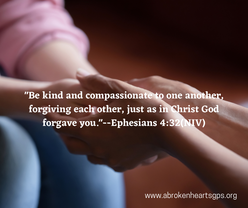
"I don't know how I feel..." "I don't even know where to begin..."
"I can't put it into words..." "I don't know..." "I just can't talk about it..."
Have you or someone you know made statements like these? If so, you are not alone. Many of us struggle to articulate our deeply personal experience of pain, trauma, and despair with others for a number of reasons. Perhaps we are uncomfortable with being vulnerable, are afraid of what others may think of us, or we are drawing from past experiences where we have shared and it do go so well. We are left trying to "figure it out" ourselves and thereby often resorting to burying our deepest hurts in the caverns of our souls beyond the scope and reach of others. The challenge with this method of coping is that it locks us in perpetual isolation with "it" whatever "it" may be--fear, shame, a memory, a regret, remorse, guilt, or a traumatic event which can lead to anxiety and depression.
So, how do we progress? How do we advance? How do we unlock the door of our self-imposed prison when it is just too scary or risky to do so? In our efforts to progress, it is important to accept the truth that it is not God's desire that we live in internal conflict, tormenting fear, dread, and woe. Christ came that we would experience life to full--with abundant peace and satisfaction (John 10:10). God wants our souls to prosper (3 John 1:2). If this is a biblical truth (and it is), then embedded in the Word of God is the capacity for us to walk this truth out in our life journey.
Once we have a biblical foundation to stand upon, we then make a volitional decision to believe and embrace this truth by faith because it is truth that frees us (John 8:32). Our Heavenly Father, who is love, makes this achievable through his abundant grace and mercy. Nestled under his blanket of warmth and safety, we are dismantled of our defenses as we bring our deepest wounds before him. Even when we feel we are inept to express our hearts and the longings of our souls, the good news is that he already knows (Psalm 139:1-4). This biblical truth lifts the burden and heaviness of trying to find ways to find ways to verbalize the very raw emotions that we hold within. Communing with the Lord in contemplative prayer is what facilitates internal reconciliation. A simple prayer like, "God, I don't know where to begin with all of this, but you know. This___________(event/experience) made me feel______________..." It's okay to stutter and stammer your way through your prayer; God understands what you are trying to say. It does not have to be eloquent and pious and lofty, just sincere, genuine, and authentic. This is the genesis of healing (Psalm 34:18, Psalm 51:17)--acknowledging the brokenness in our lives and bringing the shattered pieces of heart to the Lord. Are you willing to take a 1,000 volt risk and bring the cares of your soul to the Lord? This is a humbling, yet self-nurturing and courageous act.
In addition to cultivating a closer relationship with God, it may also be helpful to journal or seek out a trusted counselor, clergy person, or mentor with whom to share your story. Sharing our stories in a very loving and safe space fosters a sense of community as we are drawn out of self-imposed isolation in a kind and compassionate way. In so doing, we often find that we are more alike in our human experiences than we are different. We are all "growing through" life and and discovering ways to traverse the terrains of our journey.
Prayer
Father, in the name of Jesus', I confess that I carry secret wounds. I feel____________ when I think about them. It is difficult for me to talk about__________because_______. I thank you that you know me. You know my wiring, my temperament. You know how I have been impacted by what I have experienced. I thank you that your lovingkindness and compassion sustains me. I thank you that you are healing my broken heart and binding up my wounds (Psalm 147:3). I receive it now by faith, Amen.

